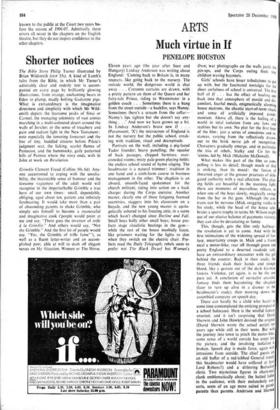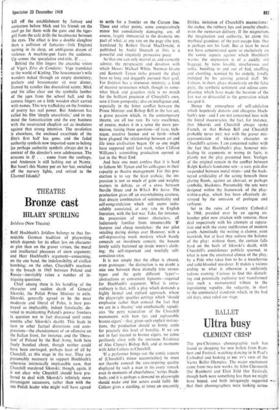Much virtue in If ARTS
PENELOPE HOUSTON
Eleven years ago (the year after Suez and Hungary) Lindsay Anderson was writing about England: 'Coming back to Britain is, in many respects, like going back to the nursery. The outside world, the dangerous world is shut away . . . Cretonne curtains are drawn, with a pretty pattern on them of the Queen and her fairy-tale Prince, riding to Westminster in a golden coach . . . Sometimes there is a bang from the street outside—a backfire, says Nanny. Sometimes there's a scream from the cellar— Nanny's lips tighten but she doesn't say any- thing . . .' And now we have grown up a bit. In Lindsay Anderson's brave new If . . . (Paramount, 'X') the microcosm of England is not the nursery but the public school, creak- ing with tradition, ritual and decrepitude.
Portraits on the wall, including a pig-faced Tudor founder; heavy panelling; the squalor of back passages, chipped furniture, over- crowded rooms; misty pale-green playing fields; the endless school sound of hymn singing. The headmaster is a natural trimmer: tradition in one hand and a sixth-form course in business management in the other. The chaplain is an absurd, smooth-faced spokesman for the church militant, riding into action on a hack charger during the Corps exercise. Another master, clearly one of those fatiguing licensed eccentrics, staggers into his classroom on a bicycle, and the new young master is apolo- getically ushered to his freezing attic, in a scene which hasn't changed since Decline and Fall. Small boys bully other small boys; house pre- fects stage ritualistic beatings in the gym— while the rest of the house morbidly listen, like prisoners waiting for the lights to dim when they switch on the electric chair. Pre- fects read the Daily Telegraph; rebels seem to prefer not The Black Dwarf but Woman's Own; war photographs on the walls jostle the pin-ups, and the Corps outing finds tiny children waving bayonets.
Girls' schools have lesser tribulations to put up with, but the fascinated nostalgia for the sheer awfulness of school is universal. The first half of If . . . has the effect of hauling One back into that atmosphere of mould and dis- comfort, fearful meals, enigmatically alarming house matrons, the chaotic start-of-term rituals and sense of artificially imposed pande- monium. Above all, there is the feeling of a world in total isolation from any laws and realities but its own. No plot for the first hour of the film : just a series of anecdotes and in- stances, varying from the reflectively drawn- out to the brisk nerve jab of recognition. Characters gradually emerge, and in particular the trio of rebels, Stalky and Co for the 'sixties, led by Mick (Malcolm McDowell).
What makes this part of the film so corn- pelting is less its detail, though much of that is striking, than its mood : the fusion of thwarted anger at the grosser practices of dele- gated authority with a real affection. The play- ing fields are beautiful in the morning light; there are moments of marvellous release, as when one of the boys slowly, magically swings from the bar in the gym. Although the con- trasts can be nervous (Mick, swigging vodka in his study, while the head of the house cele- brates a sports trophy in terms Mr Wilson might use of our elusive balance of payments victory), they can also be devastating or funny.
This, though, gets the film only halfway:- the revolution is yet to come. And with the first intimations of the widening spread of fan- tasy, uncertainty creeps in. Mick and a friend steal a motor-bike, roar off through green and pretty England to a deserted roadside café, have an extraordinary encounter with the girl behind the counter. Back in their study, the three friends slash their hands and mingle blood, like a gesture out of the dark German forests. Violence, yet again, is, to be the one pure act. A conclusion of surrealist anarchic fantasy finds them bayoneting the chaplain (later to turn up alive in a drawer in the headmaster's study), then mowing down the assembled company on speech day.
There can hardly be a child who hasn't at some time contemplated the enticing prospect of a school holocaust. Here is the wistful fantasy
enacted; and it isn't surprising that David Sherwin and John Howlett devised the original (David Sherwin wrote the actual script) ten years ago while still in their teens. But with the journey into town to pinch the motor-bike,
some sense of a world outside has crept into the picture, and the involving isolation is broken. Speech day is made farce, again with intrusions from outside. The chief guests are
an old buffer of a red-tabbed General (surely this headmaster would have collared at least Lord Robens?) and a dithering Bufiuelias cleric. Two mysterious figures in chain-mail clank emblematically about; the hatted ladies in the audience, with their melancholy con' sorts, seem of an age more suited to grand" parents than parents. Anderson and Sherwin kill off the establishment by fantasy and caricature before Mick and his friends on the roof so for them with the guns and the tiger- girl from the cafe drills the headmaster between the eyes. The effect is less a double slaughter than a collision of fantasies—little England turning in its sleep, an ambiguous dream of violence. A machine-gun faces the audience. Up comes the speculative end-title, If . . .
Behind the film lingers the anarchic vision of Vigo's Zero de Conduite: Vigo translated to the world of Kipling. The housemaster's wife wanders naked through an empty dormitory; prefects and housemaster sit over dinner, framed by candles like discredited saints; Mick and his allies clear out the symbolic lumber of the ages from the school ball, and the camera lingers on a little wooden chair carved with names. This wry trafficking on the frontiers of poetry has real power. But Anderson has called his film `deeply anarchistic,' and to my mind the fantastication and the coy business with the resurrected chaplain act as insulators against that strong intention. The revolution is elsewhere, the enclosed exactitude of the film's first half has gone, and the faded authority symbols now imported seem to belong (as perhaps authority symbols always do) in a context of the director's own adolescence. The screams in if . . . come from the rooftops, and Anderson is still lashing out at Nanny. But hasn't this Nanny put on her hat, switched off the nursery lights, and retired to the Channel Islands?



































 Previous page
Previous page